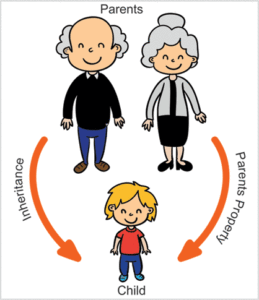Family Relationships Tested: Children Sue Mother Over House Inheritance
In a case that pierces the heart of familial bonds and legal entitlements, an elderly mother finds herself entangled in a bitter legal dispute with her own children. At the core of this family drama lies the mother’s decision to sell the family home, a move that has unexpectedly turned her children into litigants against her. This confrontation transcends the typical narrative of inheritance squabbles, showcasing a complex tapestry of emotions and legal challenges.
The uniqueness of this case lies not just in its legal peculiarities but also in its deep emotional resonance. It’s a scenario that painfully underscores the clash between a parent’s right to secure their future and children’s perceptions of their inheritance rights. This predicament, steeped in emotional turmoil and legal intricacies, presents a compelling story that demands attention.
As we delve into the details of this familial rift, we aim to maintain an engaging yet straightforward narrative. Our objective is to illuminate the nuances of this dispute, keeping the language accessible and avoiding overly ornate descriptions. In doing so, we hope to keep you, the reader, both informed and intrigued as we unravel the layers of this extraordinary family saga.
Background of the Family Situation
A judgment based on foresight and practicality is at the center of this legal tangle. The mother, having reached her golden years, confronted the realities many face in later life. With her children having long since embarked on their own journeys, the large, empty family home seemed more of a burden than a sanctuary. Her intention to sell the house was not a capricious choice but a carefully considered step to downsize and simplify her life. More importantly, it was a move aimed at securing financial stability for potential medical expenses, a concern that looms large for many seniors.
However, this pragmatic decision was met with an explosive reaction from her children. The news of the upcoming sale sparked a fierce backlash that included emotional outbursts and bitter accusations. The children, anchored in a deep sense of attachment to the family home, saw their mother’s decision as a betrayal. To them, it was not just a building being sold, but a repository of cherished memories and the final tangible link to their father, who had passed away.
Their response descended into a distressing family conflict that featured adamant opposition to their mother’s plans and ferocious arguments. Accusations flew, painting the mother’s practical and forward-looking decision as an act of selfishness, threatening to uproot cherished memories and a familial legacy. This emotional maelstrom set the stage for a legal showdown that challenged conventional notions of inheritance and parental autonomy.
Legal and Emotional Conflict
The escalating tensions within this family soon veered into the legal realm, adding a layer of complexity to an already fraught situation. The children, steadfast in their opposition to the sale of the family home, resorted to a drastic measure: legal threats against their mother. This move signaled a shift from emotional arguments to a formalized battle over perceived inheritance rights. Enlisting the services of a lawyer, they aimed to legally obstruct their mother’s decision, asserting that the house, a symbol of their childhood and their father’s legacy, was rightfully their inheritance. This legal maneuver transforms a private family disagreement into a public spectacle, raising questions about the boundaries of legal intervention in matters of family and inheritance.
For the mother, the legal threats from her children only compounded the emotional toll. The house, once a haven of family memories, became a battleground, a source of deep anguish rather than comfort. Her decision to sell, initially a step towards a simpler, more manageable future, now carried the weight of familial betrayal and legal strife. The emotional impact was profound. She grappled not only with the loss of her husband but also with the sense of alienation from her children. The memories of her late husband intertwined with the fabric of the family home, became bittersweet, tainted by the current discord. Her feelings of betrayal were palpable as the very individuals she nurtured and loved turned against her, challenging her autonomy and casting a shadow over their shared past.
Perspectives and Reactions
The fracturing of this family over the sale of a house offers a window into the varied perspectives and complex emotions that such disputes engender. At its center is the mother, whose viewpoint is steeped in pragmatism and a longing for emotional closure. Her desire to move on from a home that, in the absence of her husband, has turned into a reminder of loss rather than a source of comfort is what motivates her decision to sell. Despite being in her eyes rational, she feels deeply betrayed and hurt as her own children turn against her.
In contrast, a sense of entitlement and loss fuel the children’s perspective. For them, the family home is more than just property; it’s a bastion of childhood memories and a connection to their late father. Their legal challenge reflects a deep emotional response, rooted in the fear of losing this last tangible piece of their family history. Despite being aggressive, their motivation is to protect what they believe to be their father’s legacy and rightful inheritance.
Legal experts and psychologists viewing this case might offer diverse insights. Legally, the case touches on the rights of parents to dispose of their property as they see fit versus the expectations of children regarding their inheritance. Psychologists, on the other hand, might highlight the emotional underpinnings of such disputes, pointing to unresolved grief, communication breakdowns, and the complex dynamics of family relationships.
This situation mirrors broader societal issues surrounding inheritance and family dynamics. It raises questions about the rights of aging parents to control their assets, the expectations children have about inheritance, and how these factors can lead to deep familial rifts. Inheritance disputes often reflect not just financial interests but unresolved emotional issues, highlighting the need for better communication and understanding within families.
Advice from Experts
During this family turmoil, advice columnist Jane Green offers a beacon of possible resolution. Green suggests a middle path that might appease both parties: the mother could either sell the property to her children or help finance their purchase of the house. This arrangement would allow the mother to secure the needed funds while the children retain the family home, thus preserving their cherished memories. Green’s advice, rooted in compromise, seeks to bridge the emotional divide, suggesting a financial solution that also acknowledges the deep-seated emotional ties to the property.
However, this proposed solution does not come without its complexities. Legal and financial experts weigh in, noting that such arrangements could lead to further complications down the line. For instance, financing the children’s purchase could impact the mother’s financial stability, especially if she relies on the income for her medical expenses and retirement. Additionally, legal experts caution that this arrangement could lead to new disputes, particularly if the terms of the agreement are not clearly defined and legally binding.
Beyond Green’s advice, other experts propose alternative solutions. Some suggest mediation as a way to facilitate open communication and mutual understanding. A mediator could help both parties articulate their concerns and expectations, potentially leading to a solution that respects both the mother’s autonomy and the children’s emotional attachment to the property. Financial experts also recommend exploring other avenues for the mother to secure funds for her future needs, such as reverse mortgages or downsizing to a more affordable property, thereby avoiding the sale of the family home.
Possible Resolutions and Their Consequences
Exploring different scenarios in this family conflict reveals a complex landscape of potential outcomes and their far-reaching consequences. Let’s consider each possibility in turn:
Selling the House to the Children: If the mother sells the house to her children, it may resolve the immediate legal conflict and preserve the emotional value of the home for the family. However, this decision could place a financial burden on the children, particularly if they are unprepared to bear the costs. For the mother, this solution might offer financial relief but could also feel like a capitulation to undue pressure, possibly leaving a lingering sense of resentment.
The Mother Retaining Ownership: Should the mother decide to keep the property, asserting her independence and rights, it could provide her with financial security and a sense of control over her future. Yet, this decision risks alienating her children, potentially causing long-term emotional strain and fracturing family ties. The repercussions of this choice could extend beyond the immediate family, affecting the dynamics of future generations.
Reaching a Financial Compromise: A compromise, such as a mother downsizing and using some proceeds to assist her children, attempts to balance everyone’s needs. It acknowledges the mother’s financial requirements and the children’s emotional connections. However, this halfway solution might not fully satisfy either party and could lead to new disagreements, especially if the distribution of funds is not equitably managed.
Emotional Costs vs. Financial Realities
Each of these scenarios carries its own set of emotional and financial implications. The long-term effects on family relationships are particularly significant. A resolution that appears financially sound may still leave emotional scars, altering family dynamics for years to come. Conversely, a decision that prioritizes emotional bonds might compromise financial stability, leading to future conflicts and stress.
In navigating these waters, the importance of clear communication and legal advice cannot be overstated. The family must weigh the emotional costs against financial realities, aiming for a resolution that minimizes long-term familial discord while ensuring financial security for all parties involved. This delicate balancing act requires not only legal and financial acumen but also a deep understanding of the emotional undercurrents that define family relationships.
Legal Dynamics and Societal Trends
The conflict within this family is far from an isolated incident; it echoes a common theme in many societies where inheritance disputes often surface. Similar cases, spanning various cultures and socioeconomic backgrounds, reveal a universal challenge: balancing the legal rights of property ownership with the emotional bonds of family relationships.
In many instances, these disputes are resolved through legal intervention, where courts must weigh the written law against the nuances of familial obligations and expectations. For instance, cases where children sue for a perceived right to their parents’ property often lead to complex legal battles. These battles not only determine the legal ownership of assets but also set precedents for how such disputes are viewed in the eyes of the law.
Emotional and Financial Consequences
On the societal front, these disputes reflect deeper issues pertaining to generational wealth transfer, the evolving concept of family dynamics, and the changing perceptions of parental obligations and filial entitlements. In a society that increasingly values individual autonomy, the clash between a parent’s right to decide their financial future and children’s expectations of inheritance becomes more pronounced.
The long-term effects on family relationships and financial stability are significant and multifaceted. A resolution favoring one party may lead to lingering resentment and fractured family ties, impacting not just the immediate family but also extending to future relationships and inheritances. Financially, these disputes can deplete family resources, both through legal costs and potential loss of asset value, affecting the family’s economic standing for generations.
In navigating these complexities, families, and societies at large grapple with finding a balance that respects both legal rights and familial bonds. The resolution of such disputes often requires more than just legal judgments; it calls for empathy, understanding, and a willingness to communicate. As we consider these broader implications, the narrative remains clear and accessible, inviting readers to reflect on the delicate interplay between law, emotion, and family dynamics in the context of inheritance disputes.
Final Reflections
The key takeaway from this story is the crucial role of family communication and legal preparedness in matters of inheritance. Open dialogues can prevent misunderstandings and foster an environment of mutual respect and cooperation. Legal preparedness, on the other hand, provides clarity and safeguards individual rights, helping to navigate the complex legal landscape of inheritance.
In closing, this case serves as a poignant reminder that while inheritance disputes are inherently legal matters, their resolution often lies in the realm of emotional intelligence and familial bonds.
Related posts:
 A Beloved Icon’s Silent Battle: Bruce Willis’s Journey With Dementia and Lessons in Resilience
A Beloved Icon’s Silent Battle: Bruce Willis’s Journey With Dementia and Lessons in Resilience
 10 Signs You’re With an Emotionally Unavailable Partner
10 Signs You’re With an Emotionally Unavailable Partner
 Fostering Emotional Connection: Get to Know the Kids Better By Asking These Questions
Fostering Emotional Connection: Get to Know the Kids Better By Asking These Questions
 The Importance of Teaching Children to Become Resilient
The Importance of Teaching Children to Become Resilient
Powered by YARPP.








